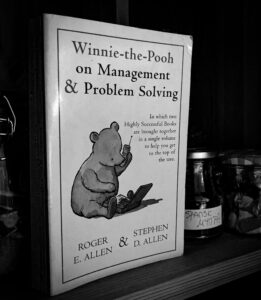 I really did not enjoy reading Winnie-the-Pooh on Management & Problem Solving by Roger E. and Stephen D. Allen.
I really did not enjoy reading Winnie-the-Pooh on Management & Problem Solving by Roger E. and Stephen D. Allen.
And in a sense… that makes me happy. Oddly enough.
Bear (haha. Pun not intended, would you believe it?) with me, as I try to explain.
You see.
I have a tendency to enjoy most of what I read.
I love books. I read lots.
And I can as easily down a quick-read from the chick-lit genre as a fact-based non-fiction book on leadership and human development, a Science Fantasy-trilogy as a spiritual deep-dive into the world of Mary Magdalen.
And most everything I do enjoy. I find something in them that attracts me, keeps me reading.
Can be the wit of it, the beauty of the language, a totally engrossing story or facts that makes my mind boggle.
“Remember, good judgment is the result of experience, and experience is the result of bad judgment.”
But more and more, I can discern (what a wonderful word that one! Discernment.) what I don’t like, what I don’t enjoy, where the language is not alluring, where I cannot get close to the characters (The Neapolitan Novels of Elena Ferrante is a great example), where something, whatever it might be, just seems off for one reason or another.
I had but read a few pages of this book when I knew it was off. For me! Which is an important caveat, as my taste is just that: mine. Noone elses. I borrowed this book from C, and he swears by it. But if I had not assigned this book a slot in my “read these 12 English books in 2020” I would have closed the book, returned it to C and never thought more of it.
But as I had chosen it, I made myself finish it, even though it took me more or less three months, with it laying on my dressing table as a constant reminder…
Perhaps it’s as simple as me not really being a Winnie-the-Pooh fan?
Perhaps the way the Allen’s emulate the way A.A. Milne writes (and is allowed to use excerpts from his books on Winnie-the-Pooh, both the written stories and the illustrations), but without being as great word-smiths as Milne?
Perhaps it was simply the wrong time for me to read it?
I don’t know, and don’t have to delve into it in-depth, but… at the same time, this is where my happiness comes in. You see, I am currently enrolled in The Creative’s Workshop (workshop run for the first time by Seth Godin on akimbo.com), and in several of the prompts (lessons you might say, three per week, over a 100-day-period) we’ve been asked to look at things such as these:
What is good, in my view? Why is it good? Who crafts good stuff (similar to that which I am working on)?
What don’t I think is good, and why? Who crafts “bad” stuff?
Who do I admire? Who do I want to emulate? And who’s the amateur, the professional and the hack in your line-of-work?
So.
Winnie-the-Pooh is helping me discern my responses to questions like these ones.
And that’s really helpful!
“…creativity […] is a way of being, of looking at things without judging them first, and that it can be learned and improved.”
The book I am blogging about is part of the book-reading challenge I’ve set for myself during 2020, to read and blog monthly about 12 Swedish and 12 English books, books that I already own.
Jag läser ganska lite just nu, och blir lättare otåligt, tror jag och just nu läser jag en bok som jag i vanliga fall skulle ha gett upp om, men något gör att jag fortsätter och så märker jag att jag långsamt liksom glider in i berättelsen, det är som att jag får spegla något i mig, att det är som att jag både läser en story och liksom läser mig själv i det här ögonblicket, som gör att jag kanske blir lite tydligare för mig själv.
Antagligen låter det där svårbegripligt, men så är det ibland 😉 Och det var just dessa ord som bubblade av att läsa din text.
Jag tror mig förstå precis vad du menar!